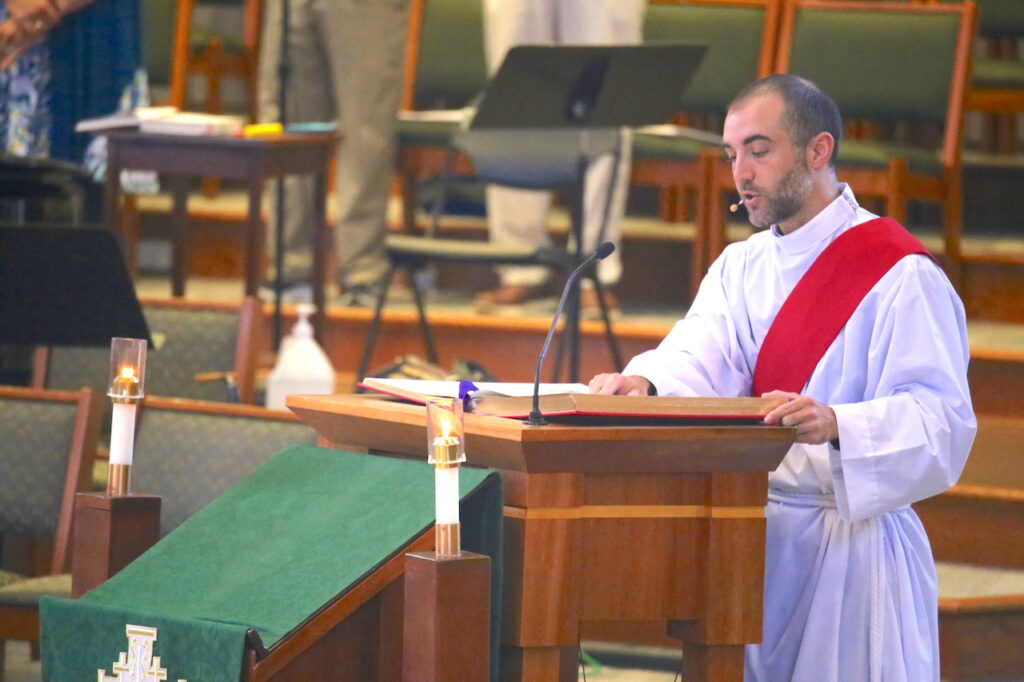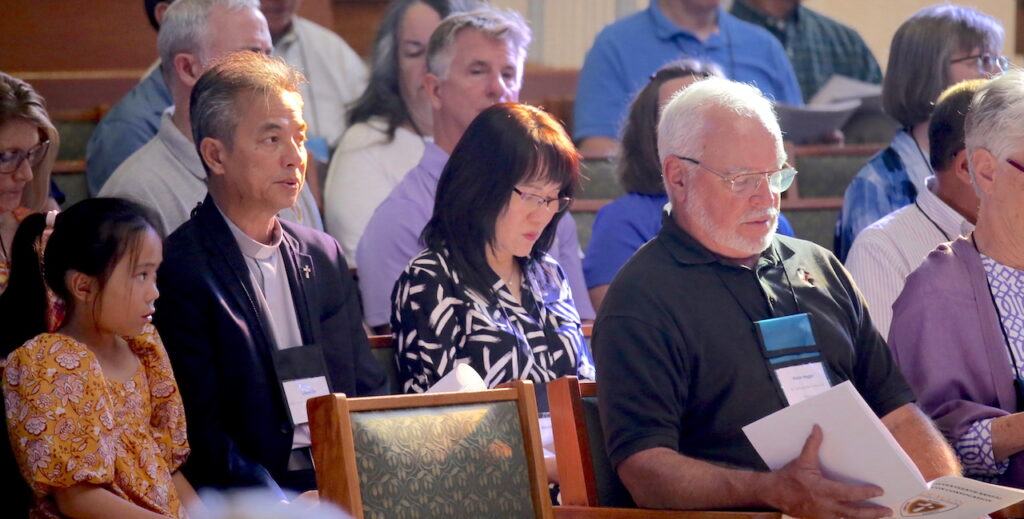In the sixth chapter of Acts of the Apostles, the Twelve Apostles faced a dilemma. Their worldly responsibilities were increasing as their flock grew, but they did not want to neglect their ministry. Their decision was unanimous: seven men, “full of the Spirit and wisdom,” were selected to assist them.
As these were the early days of the Church, it wasn’t long before the first of them, St. Stephen, was stoned to death for preaching the faith. In a nation where religious freedom is enshrined by the Constitution, this is no longer an occupational hazard for the deacons in our diocese. But to this day, the permanent diaconate still serves the Church – operating, in the words of Father Jeff Godecker, “with one foot in the Church and one foot in the world.”
“The diaconate is essential to our Church,” said Father Godecker, addressing the Seventeenth Annual Deacon Convocation Sept. 15 in Richmond. Father Godecker was visiting the convocation in his capacity as spiritual director for the Office of Deacon Formation in the Archdiocese of Indianapolis.
“You bring your experience as fathers, husbands, businessmen and corporate leaders,” Father Godecker continued. “You bring a set of skills that enter your ministries and affect your homilies in a way that, for us priests, we cannot.”
The convocation, which took place from Sept. 14-16 at the Short Pump Marriott, was an opportunity for deacons throughout the diocese to gather, share in fellowship, attend seminars and pray together. Wives were also welcome to attend, and many made the journey. Mass was held on Sept. 14 and 15 at St. Michael the Archangel, Glen Allen, celebrating the Exaltation of the Holy Cross and the feast of Our Lady of Sorrows, respectively.
The theme of the conference was “Eucharistic Discipleship,” and one of the most important topics discussed at the convocation was the National Eucharistic Revival, a three-year initiative by U.S. bishops formed partly in response to a troubling report by Pew Research Center that only 31% of Catholics believe in the real presence of Christ in the Eucharist. The initiative is one of the reasons that Eucharistic adoration and processions have seen a revival in many diocesan parishes.

Exodus 3:12
“What is the heart of human need?” Father Godecker asked the assembled deacons on Sept. 15. There were several responses: compassion, hope, to love and to be loved. As Father Godecker noted, St. Ignatius would say a desire and connection to God. Father Godecker’s definition, however, was more visceral.
“I would say that the core of human need is hunger,” he said. “We hunger for so many things. We hunger for food and drink, peace and shelter. We hunger for meaning, for purpose. We hunger to be accepted. Certainly, our deepest hunger is to love and be loved. Our hunger is probably limitless.”
“Christ speaks to us in every part of our lives through the Eucharist,” he continued. “God’s presence is real, faithful and generous. It listens and sees, heals and nourishes, is merciful. Christ is alive and active among us.”
He cited two Old Testament passages as prophetic meditations on the nature of the Eucharist. The first, from 1 Kings 17:16, describes God, through the prophet Elijah, caring for his people during a drought: “The jar of flour was not used up and the jug of oil did not run dry.”
The second, from Exodus 3:12, recalled what God said to Moses as he revealed his plans to break the yoke of Pharoah and uproot the Hebrews to a land of milk and honey, a task from which Moses cowered until he heard the words, “I will be with you.”
“There are many ways God is present with us, and the primary way is the Eucharist,” said Father Godecker. “We become what we receive. Think of the words of St. Augustine, who said that a Christian is a mind through which Christ thinks, a hand through which Christ helps and a heart through which Christ loves.”
‘It’s not just a symbol’
After the presentation, many of the men reflected on what the Eucharist means to them and to their ministry. Some, like Deacon Jim Van Wyk, Our Lady of Lourdes, Richmond, pointed to it as the very foundation of their faith. Originally a Calvinist, Deacon Van Wyk converted to Catholicism in 1979, and the Church’s understanding of the Eucharist was essential to his journey.
“Some people who have grown up Catholic from birth may not realize the importance of the Eucharist in their lives. But when you come into the Church, you realize what a transformation it is,” said Deacon Van Wyk. “We try to stress this all the time when we hand out Communion: it’s not just a symbol. It’s the body and blood of Christ.”
For others, like Deacon Andy Ferguson, St. Michael the Archangel, Glen Allen, the Eucharist was what brought them back to the Church after drifting away.
“I’m a cradle Catholic, but I fell away in college. When I met my wife-to-be, we started going to a Methodist church. We did that for about three weeks,” recalled Deacon Ferguson. “Then it came time for ‘Communion Sunday,’ and when they passed around the tray of bread and grape juice, I looked at it and realized, ‘This isn’t the Eucharist.’”
“I knew in that moment that the Eucharist was what I yearned for,” he said. “That fire lay dormant in me for some time, but it brought me back to the Church.”
Deacon John Carey, St. Victoria, Hurt, has taken the lead on planning quarterly adoration, a new practice at the parish. On Saturday, Sept. 23, he led a guided service, explaining what’s happening and encouraging worshippers to be silent and to listen to God, accompanied only by the swing of a thurible and the chants of St. Thomas Aquinas. (See ‘Eucharistic Revival reaches rural Virginia’).
Luke 1:39
The Eucharistic theme was complemented by the words of Bishop Barry C. Knestout, who called on the deacons to imitate Mary.
In his remarks to the deacons and their wives after dinner Sept. 14, Bishop Knestout recalled his experience in Portugal at World Youth Day, the theme of which was “Mary rose up and went with haste” (Luke 1:39). The passage refers to the Visitation, in which Mary, carrying the Christ-child, journeys to visit her cousin Elizabeth, an episode Pope Benedict XVI called “the first Eucharistic procession.”
“Mary, when she rises, is awake and alert to the needs of those around her,” said Bishop Knestout. “Our Lady is an example of what it means to be a disciple of Christ. Deacons are meant to be disciples as well.”
“When you listen to the voice of the Spirit, you are called to act upon it in charity and love. That’s what Our Lady does, and she does it with focus and zeal,” he continued. “A deacon’s life, especially in the parishes, is to be that person who’s attentive to the needs of the parish – and then to act upon them, to respond in charity with attention and focus.”

